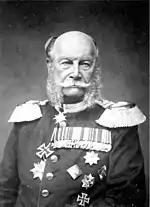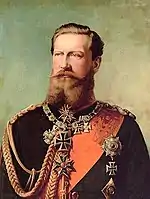Year of the Three Emperors
The Year of the Three Emperors, or the Year of the Three Kaisers, (German: Dreikaiserjahr) refers to the year 1888 during the German Empire in German history.[1][2][3][4] The year is important because two German Emperors, or Kaisers, died. This meant that there were three emperors in a year..[1] The three emperors who ruled Germany during this year were Wilhelm I, Frederick III and Wilhelm II. The mnemonic “drei Achten, drei Kaiser” (English: "three eights, three emperors") is still used today in Germany to remember which year it was.[5]


Kaiser Frederick III was in charge for only 99 days during the Year of Three Emperors (9 March – 15 June 1888).

References
- Pike
- Tipton, p. 175.
- Nichols, p. 1.
- Berghahn, p. 282.
- Hein, p. 271.
This article is issued from Wikipedia. The text is licensed under Creative Commons - Attribution - Sharealike. Additional terms may apply for the media files.